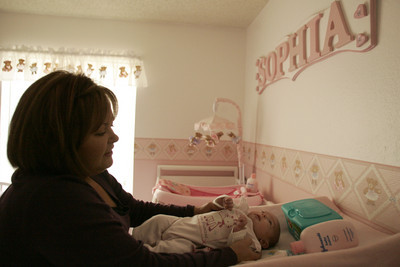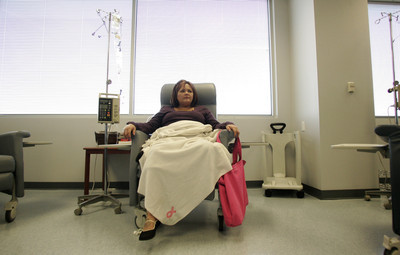PREGNANT PAUSE
Antonio and Julie Coca spent months working with fertility specialists and handling the roller coaster ride of uncertainty before they got word they would be parents.
Six months into the pregnancy, and a felt breast lump later, they received a phone call that turned an already delicate situation into a major challenge.
"We waited through all the telephone calls to see if we were positive (pregnant). We beat that. And now that we're pregnant we get this terrible news -- my wife has breast cancer,'' Antonio said.
"There were so many emotions,'' said Julie, who has a family history of breast cancer. "We didn't know if we would have to sacrifice the baby or my life.''
But the Cocas learned being pregnant with breast cancer doesn't mean one life has to be lost in order to save the other.
In the past two decades, studies have shown that a combination of breast cancer drugs can shrink the cancer while the mother continues nurturing her unborn child. Those studies also show that both mother and child can live healthy and productive lives after breast cancer.
Dr. Mary Ann Allison, an oncologist with Comprehensive Cancer Centers of Nevada, said some chemotherapy drugs are safe to give to women who are pregnant and have breast cancer. However, the safest time to give those drugs is during the second and third trimesters.
Certain chemotherapy drugs used in breast cancer treatment don't even penetrate the amniotic sac to the degree that nicotine and caffeine will, Allison said.
After the first trimester, the baby is developed enough so the mother can undergo chemotherapy, she said.
"We have close to 20 years of research now."
Allison, who specializes in breast cancer treatment and research, was referring to an ongoing study by MD Anderson researchers that began in 1989. The study is following a group of women diagnosed with Stage II and Stage III cancer during their second and third trimesters.
The women and their children are being followed to determine outcomes for both.
The study began with one mother who was diagnosed with breast cancer during her fifth month of pregnancy. At the time, her choices were to terminate the pregnancy and treat the cancer, or delay treatment until after birth.
She turned to MD Anderson for treatment. Since then, Allison said, dozens of women have taken part in the trial.
Most of the women underwent a modified radical mastectomy or lumpectomy before undergoing the chemotherapy.
Combination chemotherapy has been safely administered to women in the second and third trimester, with minimal complications to mother and fetus.
Over the years, researchers have discovered newer chemotherapy drugs to treat breast cancer, but there's no data to prove they can be used routinely to treat breast cancer in pregnant women, Allison said.
"As you might expect, it is not as easy to do trials on pregnant women,'' she said. "The only time there is anxiety is if it's the first trimester. You can still work around it, but you have to wait until after the first trimester before you can give chemotherapy.''
Allison said the treatment plan for Julie Coca was to coordinate the chemotherapy drugs that usually are used to treat cancer in pregnant women around her delivery date. Once she delivered her baby, she began rounds of chemotherapy that involved drugs that have not been tested on pregnant women who have breast cancer.
"It's worked out well,'' Allison said, referring to Coca. "She did great.''
Julie Coca couldn't undergo a lumpectomy or mastectomy while pregnant because her tumor was too large. She underwent four rounds of chemotherapy, however, one round every three weeks.
The Cocas said they had major concerns about this at first, but they had faith in Allison.
"My mother passed with breast cancer. My aunt is a survivor and that gave me hope,'' said Julie Coca, 39. "The first two weeks were probably the most trying. We didn't know where we were going with this. I have a child in high school, and I wanted to see him graduate. There was just so much raw emotion.
"Dr. Allison told me I would live to see my son and daughter graduate,'' she said while holding her 7-week-old daughter, Sophia.
The treatment process is just beginning for another Allison patient who has breast cancer and is pregnant.
Christy Heaton, 38, discovered a lump in September, during her second trimester.
She told her doctor and a biopsy was performed.
"It was pretty shocking because I'm pretty healthy,'' Heaton said. "My first thought was, 'Am I going to have to introduce dangerous chemicals into my body and what would that mean for my child?'''
Heaton's tumor was much smaller than Coca's, so it could be removed before chemotherapy treatment. The tumor was removed in mid-October, and Heaton is undergoing several rounds of chemotherapy.
For the next couple of months, she will regularly be seeing a perinatologist -- an obstetrical sub-specialist who deals with high-risk pregnancies -- and maintaining her sanity.
"My mother survived breast cancer, and I felt better after talking to her,'' said Heaton, sitting in an infusion chair at Comprehensive Cancer Centers of Nevada's southeast Henderson location.
"My mother told me 'Look at me. It's going to be fine.'''
According to medical research, 2 percent of all breast cancer cases involve women who are also pregnant.
The incidence of breast cancer during pregnancy is likely to increase as more women delay childbearing until later in their lives.
"We've had one other pregnant woman with breast cancer,'' Allison said. "The bottom line is we can give chemotherapy to a pregnant woman safely. We've come a long way.''
Contact reporter Annette Wells at awells @reviewjournal.com or 702-383-0283.
ON THE WEB
Watch the video



















